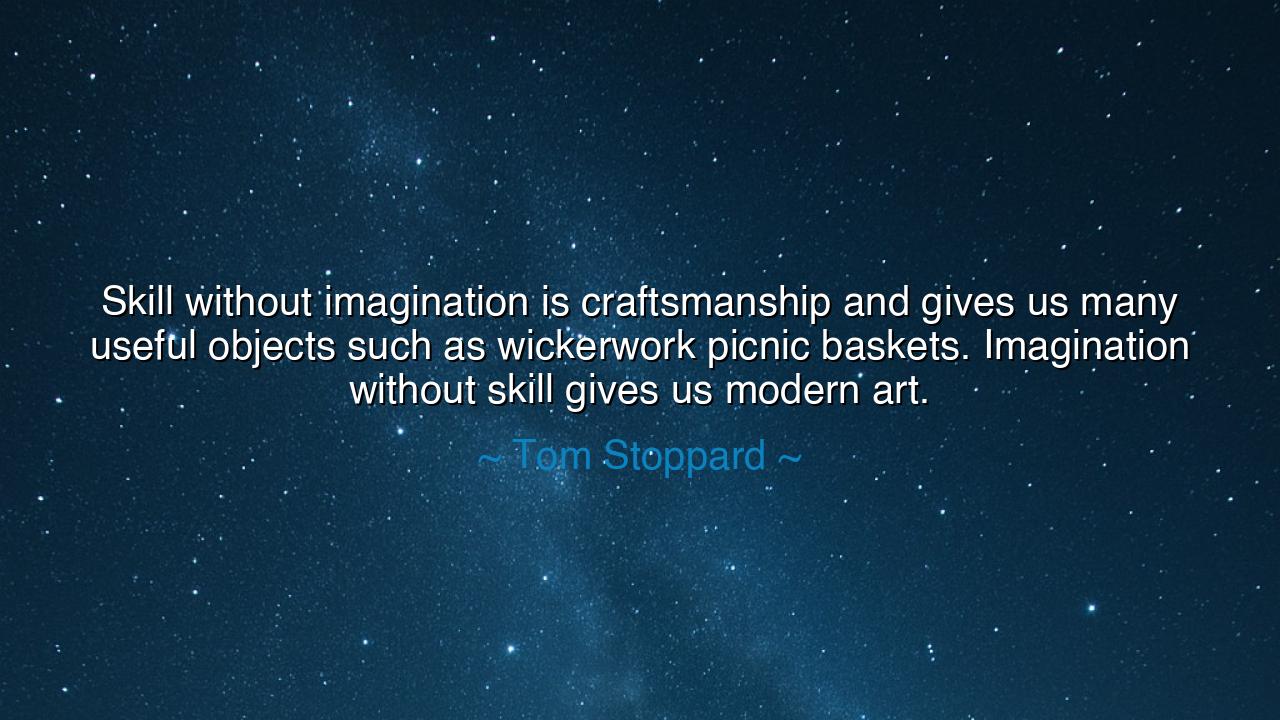
Skill without imagination is craftsmanship and gives us many
Skill without imagination is craftsmanship and gives us many useful objects such as wickerwork picnic baskets. Imagination without skill gives us modern art.






The Harmony of Hand and Spirit: On Skill and Imagination
Hear, O listener of wisdom, the words of Tom Stoppard, playwright of paradox and philosopher of wit: “Skill without imagination is craftsmanship and gives us many useful objects such as wickerwork picnic baskets. Imagination without skill gives us modern art.” Though his words carry laughter, their meaning runs deep — for he speaks not merely of art, but of the eternal struggle between discipline and inspiration, between the hand that builds and the mind that dreams. He reminds us that true creation is born only when these two forces unite, for neither skill nor imagination alone can give birth to greatness.
In this saying, Stoppard distinguishes between craftsmanship and creativity. The craftsman is master of form, yet bound by it; his skill is precise, his product perfect in function, yet lacking the spark of the divine. He weaves baskets that hold bread, builds chairs that hold men — useful, yes, but without wonder. The artist, when possessed only by imagination, reaches for the stars without the ladder of skill; his visions are vast, but his tools are blunt. The result may dazzle or confound, but it lacks the clarity of mastery. Stoppard’s jest conceals a timeless truth: that art is born when imagination and skill walk hand in hand — when the soul’s vision finds its vessel in the disciplined hand.
This harmony has been the pursuit of all great creators. The ancient sculptors of Greece, who carved marble into gods, understood that imagination must be guided by law — by proportion, by rhythm, by form. Their work endures not only because they dreamed of beauty, but because they learned how to shape it. So too with Leonardo da Vinci, whose imagination spanned heaven and earth, yet whose discipline in anatomy, geometry, and observation gave body to his visions. His genius was not divine madness alone, but the union of intellect and technique, of dream and diligence.
Consider, too, the story of Michelangelo, who once said that every block of stone contains a statue, and it is the task of the sculptor to discover it. His imagination saw the figure imprisoned within the marble — yet it was his skill, honed by years of labor, that released it. Without that skill, his vision would have remained invisible, trapped within his mind. Without imagination, his chisel would have produced only lifeless stone. But together — hand and heart, skill and imagination — they created the David, a work that stands not only as stone, but as spirit made visible.
Yet Stoppard’s jest also contains a warning to the age of excess imagination — to those who mistake wildness for genius and confusion for depth. In modern art, he sees the untempered imagination: the artist who breaks form before mastering it, who rebels before understanding what he rebels against. There is power in this defiance, but also danger. For when imagination lacks the grounding of craft, it risks becoming self-indulgent — a flame without a lamp, brilliant for a moment but soon extinguished. The ancients knew this well: that mastery must precede freedom, and that only through form can meaning endure.
But Stoppard’s wisdom is not cynicism — it is balance. He reminds us that skill alone, though admirable, can become sterile if divorced from imagination. A world built only on utility gives us tools but not dreams, order but not soul. Likewise, imagination without structure may provoke thought, but it cannot sustain wonder. The wise, therefore, seek not to choose between the two, but to unite them — to labor as craftsmen and dream as artists. The true creator is both servant and seer: bound by the limits of his tools, yet freed by the vastness of his mind.
So let this be your teaching, O reader of life’s art: Cultivate skill, but never let it confine you; nurture imagination, but never let it consume you. Practice until your hands obey the music of your mind. Study the old masters not to imitate them, but to learn how they balanced vision and discipline. Whether you build, paint, write, or live, remember this truth — that beauty arises when precision serves passion, and passion respects precision. Skill is the earth; imagination is the sky; creation lives in their meeting.
Thus, as Tom Stoppard reminds us, the harmony of craft and imagination is the highest art — not only in painting or poetry, but in living itself. The wicker basket holds our bread, and the daring canvas feeds our soul; both are needed, both sacred. Strive, therefore, to master your craft, yet keep your heart wild. For only when the trained hand obeys the dreaming mind does humanity rise from usefulness to glory, from survival to creation, from the ordinary to the eternal.






AAdministratorAdministrator
Welcome, honored guests. Please leave a comment, we will respond soon